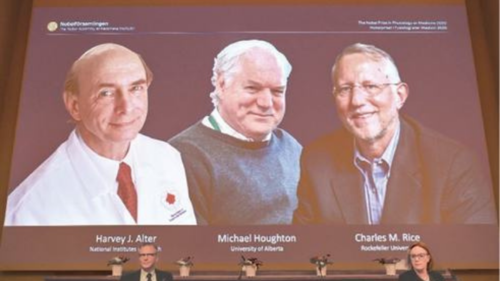STOCKHOLM: US scientists David Julius and Ardem Patapoutian on Monday won the Nobel Medicine Prize for discoveries on receptors for temperature and touch.
The duo’s research, conducted independently of each other in the late 1990s and 2000s, is being used to develop treatments for a wide range of diseases and conditions, including chronic pain.
Julius, who in 2019 won the $3-million Breakthrough Prize in life sciences, said he was stunned to receive the call from the Nobel committee early on Monday.
“One never really expects that to happen... I thought it was a prank,” he told Swedish Radio.
Our ability to sense heat, cold and touch is essential for survival, the Nobel Committee explained, and underpins our interaction with the world around us.
“The groundbreaking discoveries... by this year’s Nobel Prize laureates have allowed us to understand how heat, cold and mechanical force can initiate the nerve impulses that allow us to perceive and adapt to the world,” the Nobel jury said.
“In our daily lives we take these sensations for granted, but how are nerve impulses initiated so that temperature and pressure can be perceived? This question has been solved by this year’s Nobel Prize laureates.”
Julius, 65, was recognised for his research using capsaicin — a compound from chili peppers that induces a burning sensation — to identify which nerve sensors in the skin respond to heat.

The human body generates heat in response to inflammation, so we can protect the affected area and allow it to heal.
Julius told Scientific American in 2019 that he got the idea to study chili peppers after a visit to the grocery store.
“I was looking at these shelves and shelves of basically chili peppers and extracts (hot sauce) and thinking, ‘This is such an important and such a fun problem to look at. I’ve really got to get serious about this’,” he said.
Patapoutian’s pioneering discovery was identifying the class of nerve sensors that respond to touch.
Julius, a professor at the University of California in San Francisco and the 12-year-younger Patapoutian, a professor at Scripps Research in California, will share the Nobel Prize cheque for 10 million Swedish kronor ($1.1 million, one million euros).
Published in Dawn, October 5th, 2021















































